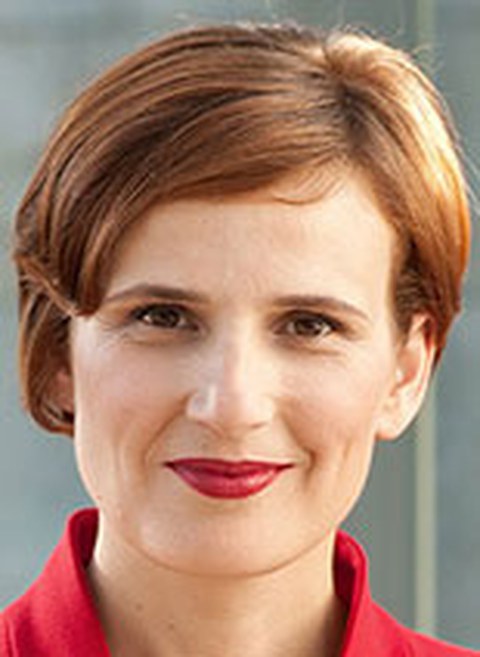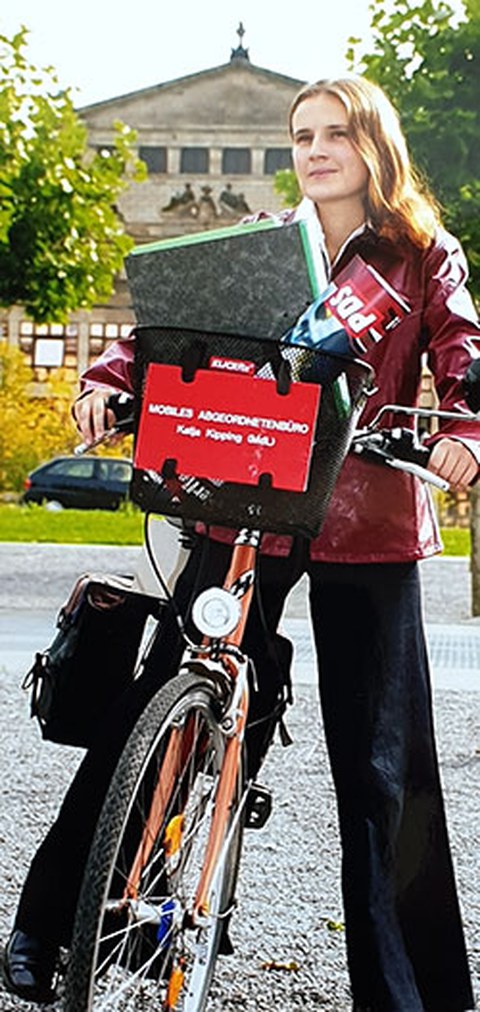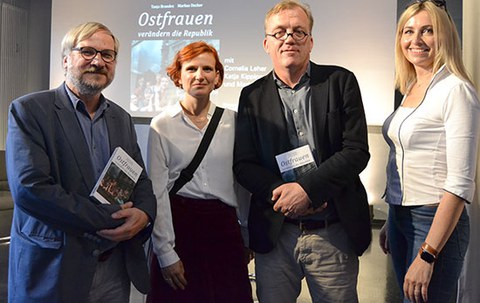A leading politician with her feet on the ground
(Interview from 2019)
Dagmar Möbius
For a long time, Katja Kipping had an issue with the term "leadership". Yet, in her youth, she was class and school president, and organized parties at her school. At 21, she was a Dresden city councilwoman, and at 25, a member of the executive of her party's parliamentary group in the state parliament. At 27, she entered the German Bundestag, and at 34, she was elected chairwoman of Die Linke, a democratic-socialist political party in Germany. Kipping, who is a Slavic studies graduate, could have seen herself becoming a professor. "But so far, politics has always called," says the 41-year-old from Dresden.

Katja Kipping has been a member of the German Bundestag since 2005. She has been co-chair of Die Linke ("The Left" party) together with Bernd Riexinger since 2012.
Speaking up, making a difference, and taking responsibility is what motivates her. Katja Kipping tells us that "the fall of the Berlin Wall sparked something in me; it pushed me to engage with politics." Katja Kipping was twelve years old in 1990. She felt the changes that accompanied the political upheaval at home. Robotron, the largest manufacturer of electronics in the former German Democratic Republic, where her father worked as an engineer, was closed. Her father then became self-employed. Injustices angered the young Katja. She got involved in the youth association "Roter Baum" (“Red Tree”) and in a "Grüne Liga" (“Green League”) environmental group. After graduating from Annen-Gymnasium high school in Dresden, she headed to Russia in 1996 for a year's volunteering. That time in Gatchina left its mark on her.
Katja Kipping then decided on a degree in Slavic studies and Slavic literature with minors in American studies and law at TU Dresden (TUD). She managed double the usual workload in her first two years. Her plan? "I wanted to go back to Russia, or to the United States." But then a protest movement emerged at the university. "The lecture halls were so full that you couldn't get a seat. And there were funding cuts." The young student was involved in the TUD "protest office" (Protestbüro) in 1997/98. At the height of the protests, 10,000 people demonstrated in front of the state parliament in December 1997. "We wanted alternative types of classes, for example a Studium generale," she says, outlining the demands at the time. "Unfortunately, the protests soon died down." After the Christmas vacation.

Students protest about conditions at TU Dresden in the late 1990s.
Katja Kipping was not about to sit on her hands. She joined the PDS in April 1998 at the age of 20. Just one year later, she was elected to Dresden City Council and to the Saxon State Parliament. There, her roles included that of spokeswoman on transport and energy policy. She was now often dealing with her university workload at nights and on weekends while she concentrated on politics during the day. In 2003, the year of her graduation (dissertation topic: interdependencies between politics and literature, exemplified by works by Chernyshevsky, Chekhov, and Blok), she was elected deputy chairwoman of the left-wing PDS party. Her focus from now on was the "Agenda Sozial" (PDS "social agenda") and establishing links with social movements. Her political rise continued. She has been a member of the German Bundestag and social policy spokesperson for the Die Linke parliamentary group since 2005. In 2007, she became deputy chairwoman of her party. Since June 2012, she has been co-leader of the party together with Bernd Riexinger.

"It's okay to pose on a poster," says Katja Kipping (pictured here as a young member of parliament), "but even though I think the gender quota is a good thing, I want women and men to be equals in the workplace."
Katja Kipping is co-leader of 62,000 party members. She has a particular responsibility to the 100 full-time employees at the party's national headquarters. She is not on her own, she stresses, noting that she has never known Die Linke without a gender quota. "And that's a good thing." Katja Kipping dates her first success as a leader to the merger of the PDS and WASG (Wahlalternative Arbeit und soziale Gerechtigkeit – "electoral alternative for work and social justice") to form a new party. "I had just got involved at a national level. Many people were opposing the merger because they were afraid of the new," she recalls. But she managed to convince them. She was also able to garner support for idea of "Sanktionsfreiheit" (an end to sanctions for failure to comply with the conditions of unemployment benefit). "I had to fight for that, even within my own ranks. Now, it has broad support. Even within the SPD, more and more voices are coming out in favor of the move. What we need now are majorities to the left of the CDU-CSU to implement it."
Judith Kainer is very happy with Katja Kipping as her boss: "Katja Kipping is a politician who will always keep her feet on the ground. What is more, she has a strong and comprehensive understanding of future structural requirements in our society." Judith Kainer has managed Katja Kippings' office at the German Bundestag since 2015. The literary studies graduate was previously Kipping's personal assistant at the party's national headquarters.
Katja Kipping now uses her degree indirectly. "The academic writing, research, and presentation skills I learned at university are very helpful in my policy work and in publishing. Knowledge of the law is also hugely important for my legislative work as a member of parliament," she says. Professor Ludger Udolph at the Institute of Slavic Studies was the member of staff she had most to do with. "I owe my engagement with Russian literature to him." She cites Tolstoy's novella "The Cossacks" as an example.
In early July 2019 – between our two interviews with her – came a striking newspaper headline: "Katja Kipping could be tempted by move out of the political spotlight." She knows there is a life outside politics – and not just since the birth of her daughter. "I can see myself continuing in a leading political role, but I can also see myself as a politician focused purely on specific policy areas and the fight against poverty. I have always made sure to lead an emotionally and intellectually rich life outside politics as well, so I don't necessarily need the recognition and attention you get in a top job. But I'm not bitter or exhausted either," she stresses. She is driven by her commitment to a universal basic income and the fight against the Hartz IV unemployment benefit system. Katja Kipping thinks inner freedom is important.
Although she thinks it's probably too late for an academic career, she does find the thought of a professorship appealing. So far, however, the party's call has always been stronger. And what direction she takes in future will not be decided by her alone. "Right now, we have a situation in our society that is completely unclear" is her view before and after the state elections in Saxony and Brandenburg. "There could be new elections at any time. The entire Federal Republic of Germany could shift to the right, or there could even be majorities to the left of the CDU-CSU." The thought of a potential government role is not a source of trepidation. Even if she sometimes has to deal with criminal attacks and threats. "It's something of an occupational hazard," she comments.
Away from political life, Katja Kipping regularly schedules time out for family, friends, and vacations. Chat on a regular "girls' night out" is about men, literature, and fashion, not leadership or politics. "There, I'm just a friend," she laughs.
"You can't plan a career path like mine," says Katja Kipping. She encourages more people to fight for things that are important to them, and to stand up and take on responsibility at crucial moments. For example, she still sees the division of care and family work as "one of the greatest sources of injustice there is." And because she knows where the problems lie, she has joined the cross-party initiative "Eltern in der Politik" ("Parents in Politics"). Katja Kipping would like to see more people who have raised children or cared for relatives in positions of responsibility.

The book "Ostfrauen verändern die Republik" (“East German Women changing politics”), published in 2019, features a profile of Katja Kipping (2nd from left). Pictured here in discussion with publisher Dr. Christoph Links (left), co-author Marcus Decker (2nd from right), and pilot Cornelia Leher (right).
Contact:
Katja Kipping, MdB
Sozialpolitische Sprecherin
Fraktion DIE LINKE.
Deutscher Bundestag
Platz der Republik 1
11011 Berlin
Telefon: 030 227-70526
E-Mail
Web
